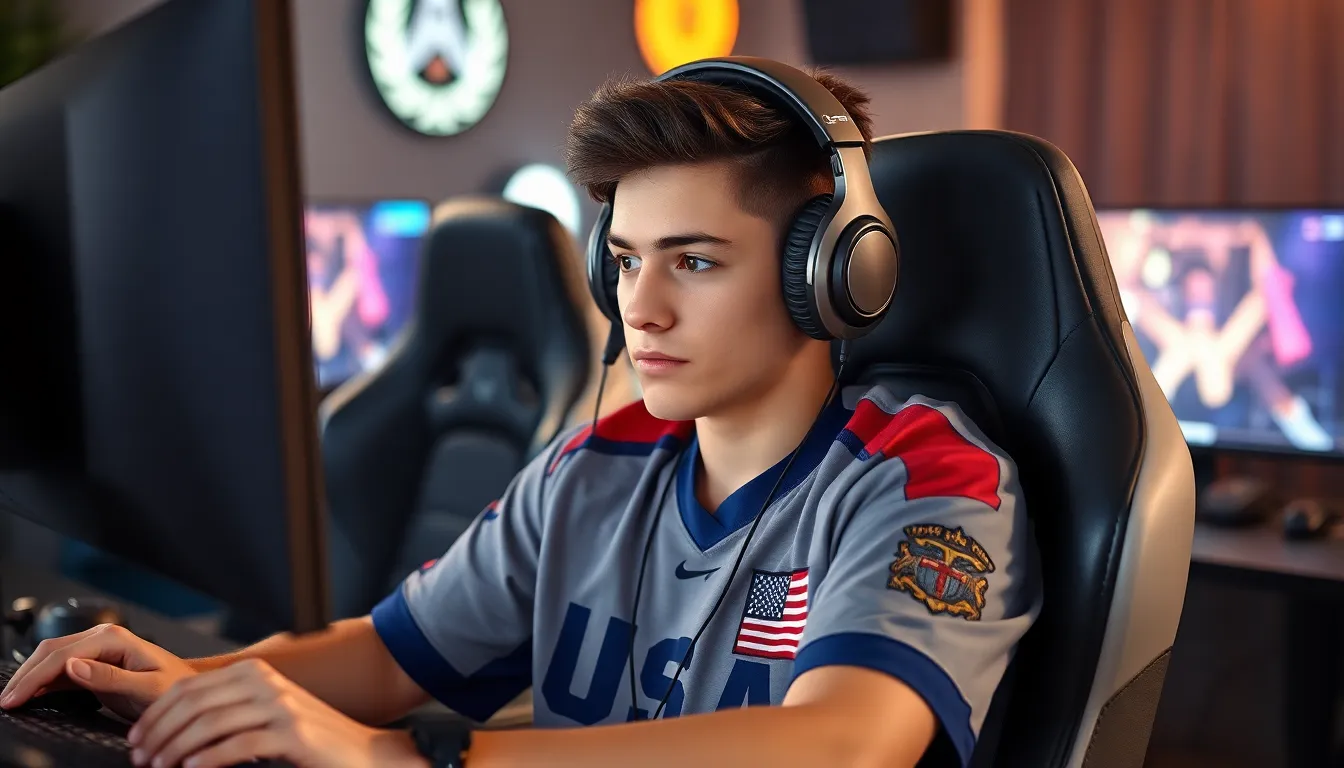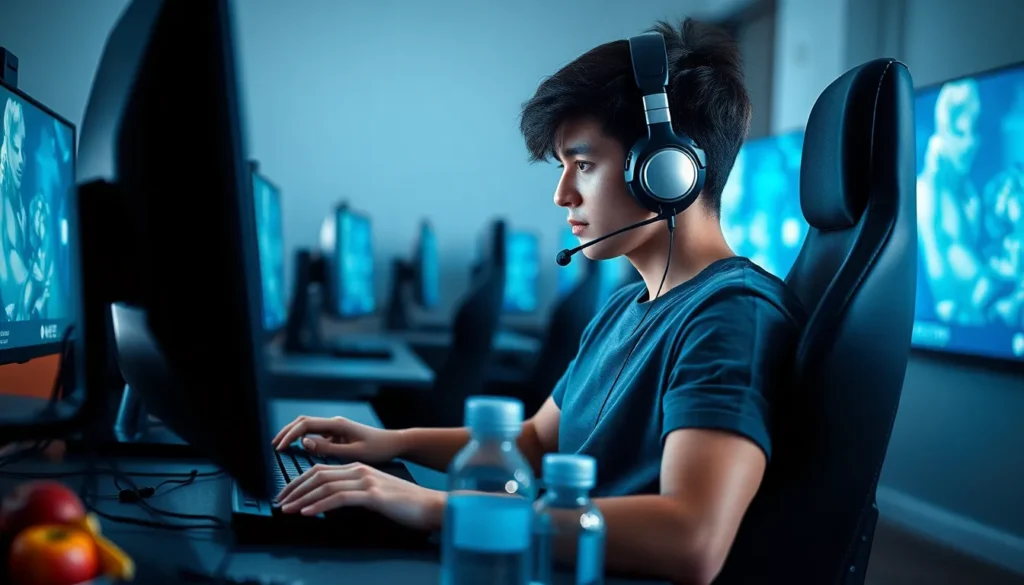Table of Contents
ToggleIn the fast-paced world of esports, players often find themselves glued to their screens for hours on end, battling it out in virtual arenas. But just like a well-timed headshot, health and wellness can’t be overlooked. While gamers may have lightning-fast reflexes, neglecting their physical and mental well-being can lead to a game over in real life.
Imagine trying to conquer the latest gaming challenge while battling fatigue or stress. Not exactly the ultimate power-up, right? It’s time to level up not just in-game but also in health. By embracing strategies for physical fitness, mental resilience, and proper nutrition, players can enhance their performance and enjoy a happier gaming experience. After all, a healthy gamer is a happy gamer—and who doesn’t want to be the MVP of both the virtual and real worlds?
Understanding Esports Health And Wellness
Esports players face unique health challenges that impact their performance and well-being. Prioritizing health is essential for sustained success in competitive gaming.
Importance Of Health In Gaming
Physical fitness contributes significantly to stamina and reaction times, both crucial for gaming. Mental wellness leads to enhanced focus, reducing the chances of burnout during intense sessions. Players who engage in regular exercise often experience improved mood and motivation, which can translate into better gameplay. Nutritional choices directly influence energy levels and cognitive abilities, making proper diet a critical component for competitive gamers. Maintaining overall health allows athletes to perform at their best, both in and out of the game.
Common Health Issues In Esports
Esports players often encounter various health issues, including repetitive strain injuries, such as carpal tunnel syndrome. Extended gaming sessions can lead to eye strain or fatigue from prolonged screen exposure. Mental health concerns, including anxiety and depression, frequently arise due to high-pressure environments and rigorous competition. Sleep disorders are common, with many players sacrificing rest to practice. Recognizing these issues plays a key role in developing effective health strategies to support gamers.
Physical Health Concerns

Esports players encounter various physical health issues stemming from their unique gaming lifestyles. Understanding these concerns enhances performance and promotes longevity in the industry.
Sedentary Lifestyle Effects
Sedentary habits significantly impact physical health. Staring at screens for extended periods can lead to weight gain, musculoskeletal discomfort, and cardiovascular problems. Studies indicate that more than 60% of gamers report experiencing back pain due to poor posture and lack of movement. Eyestrain is another common issue, often resulting from prolonged exposure to screen glare. These effects highlight the urgency for players to adopt healthier habits. Ignoring these concerns may diminish overall well-being and impair gaming performance.
Importance Of Exercise And Movement
Incorporating exercise into daily routines is crucial for esports athletes. Regular physical activity boosts cardiovascular health and enhances muscle strength. Engaging in just 30 minutes of moderate exercise five times a week can improve focus and recovery. Stretching and mobility exercises can prevent injuries associated with repetitive motions. Moreover, physical fitness directly correlates to stamina, allowing players to endure longer gaming sessions. Developing a movement strategy not only benefits physical health but also fosters mental resilience, crucial for high-pressure competitive environments.
Mental Health In Esports
Mental health plays a crucial role in esports, directly impacting player performance and satisfaction. Addressing mental health challenges is essential for sustaining success in competitive gaming.
Stress And Anxiety Among Gamers
Stress and anxiety frequently affect esports players, stemming from intense competition and high expectations. Players often experience pressure to excel, which can lead to burnout. Statistics indicate that nearly 70% of esports athletes report high levels of stress during tournaments. Managing these feelings is vital for maintaining focus and optimal performance. Eye strain and sleep deprivation further exacerbate anxiety levels. Recognizing these factors is the first step toward fostering a healthier gaming environment.
Strategies For Mental Well-Being
Promoting mental well-being among gamers requires intentional strategies. Mindfulness practices, such as meditation and breathing exercises, effectively reduce stress. Incorporating regular breaks during gaming sessions also helps mitigate fatigue. Social support plays a significant role, as engaging with peers can alleviate feelings of isolation. Developing a structured routine encourages balance between gaming and personal life. Prioritizing these strategies not only enhances mental health but also boosts overall gameplay.
Nutrition And Hydration
Nutrition and hydration form the foundation of health for esports players. Proper food and fluid intake significantly impact energy levels and cognitive function.
Optimal Diet For Gamers
A balanced diet enhances performance. Gamers should include complex carbohydrates like whole grains and fruits for sustained energy. Lean proteins such as chicken and fish support muscle recovery. Healthy fats from sources like avocados and nuts contribute to brain health. Vitamins and minerals from vegetables improve overall well-being. Limiting processed foods and sugars prevents energy crashes and supports concentration. Nutritionists recommend regular meal times to maintain consistent energy levels. For optimal focus, a well-planned diet enhances reaction speed and decision-making abilities.
Importance Of Staying Hydrated
Staying hydrated directly impacts cognitive and physical performance. Dehydration can lead to fatigue, reduced focus, and poor cognitive function. Players should drink water before, during, and after gaming sessions. Experts suggest consuming at least 2 to 3 liters of water daily, depending on individual activity levels and sweat rates. Incorporating electrolyte-rich beverages can help replenish lost minerals during intense sessions. Monitoring hydration status, like checking urine color, can provide insights into water intake. Prioritizing hydration promotes clearer thinking and better overall game performance.
Health and wellness are vital for esports players aiming for long-term success. By prioritizing physical fitness mental resilience and proper nutrition they can enhance their performance and overall well-being. Addressing common health issues and adopting effective strategies can significantly improve gaming experiences both in and out of the virtual arena.
As the esports landscape continues to evolve the importance of maintaining a balanced lifestyle becomes increasingly clear. Gamers who invest in their health not only perform better but also enjoy a more fulfilling and sustainable career. Embracing these principles lays the foundation for a healthier and more successful future in esports.




